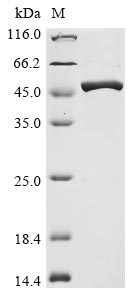This recombinant avian infectious bronchitis virus nucleoprotein (N) is produced in an E. coli expression system and spans the full length of the protein, from amino acids 1 to 409. It features a C-terminal 6xHis-tag for easy purification and detection. The protein achieves a purity greater than 85% as verified by SDS-PAGE, ensuring reliable results for research applications.
The nucleoprotein (N) of the avian infectious bronchitis virus appears to play a crucial role in the virus's replication and assembly processes. It's a structural protein that binds to the viral RNA, forming the ribonucleoprotein complex. This protein seems integral to the study of viral pathogenesis and immune responses, making it an important focus in virology research.
Potential Applications
Note: The applications listed below are based on what we know about this protein's biological functions, published research, and experience from experts in the field. However, we haven't fully tested all of these applications ourselves yet. We'd recommend running some preliminary tests first to make sure they work for your specific research goals.
Avian infectious bronchitis virus Nucleoprotein (N) is prone to forming inclusion bodies (insoluble aggregates) when expressed in E. coli. Even if soluble, the protein may misfold and fail to form correct oligomeric structures essential for its RNA-binding function. While the C-terminal 6xHis tag facilitates purification, it cannot ensure proper folding. Experimental validation is crucial, but negative results only indicate that "this E. coli-expressed preparation lacks activity," not that IBV N protein inherently lacks the function.
1. Antigen for IBV-specific Antibody Development
This application remains viable as antibody development relies on linear epitope availability rather than native folding. Even if misfolded, the protein can generate antibodies against sequence-specific epitopes. However, antibodies may not recognize conformational epitopes of the native protein.
2. Biochemical Characterization and Functional Assays
Characterization can assess basic properties, but functional assays likely yield negative results. Any observed "activity" requires rigorous controls to distinguish genuine function from non-specific effects.
3. ELISA-Based Research Assays
Immunoassays rely on antibody-epitope binding rather than native protein function. The protein can serve as a standard for detection assays regardless of folding status.
Final Recommendation & Action Plan
The E. coli expression system is fundamentally limited for this viral nucleoprotein due to high risks of aggregation and misfolding. This protein is primarily suitable for applications that don't require native folding (Antibody Development and ELISA). Avoid interaction studies due to the high risk of artefacts. If functional studies are attempted, negative results must be interpreted as limitations of the expression system, not inherent properties of IBV N protein. For reliable functional studies, consider alternative expression systems (e.g., mammalian, insect cells) that better support viral protein folding. Always include appropriate controls and acknowledge system limitations when interpreting results.




